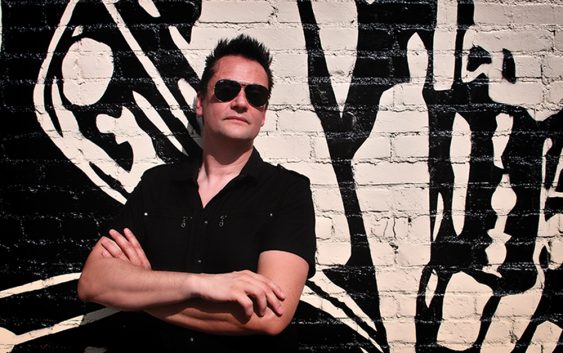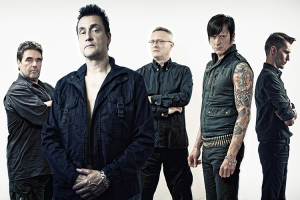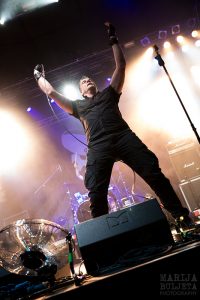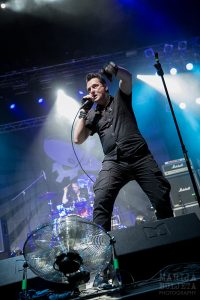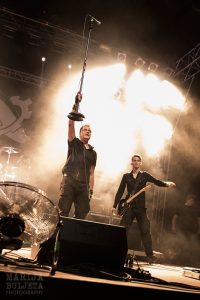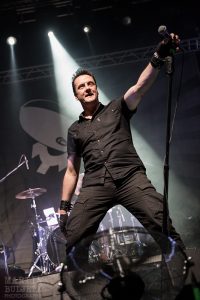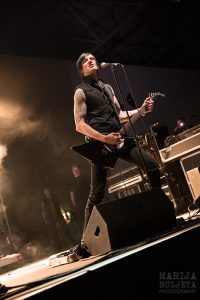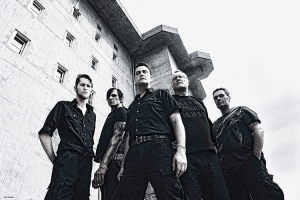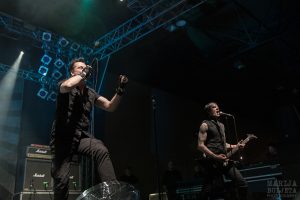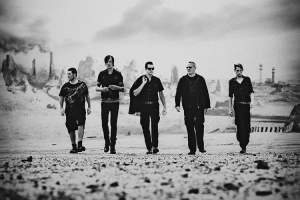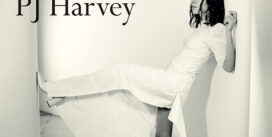Die Krupps are known as the pioneers of industrial-EBM and industrial-metal genres. Since their early days, they have been experimenting with sound wisely by merging different styles and embracing new ideas. Exploring different paths with their music made their expression unique and recognizable. They have influenced many later bands and they are always warmly welcomed by the fans all over the world. Today we are speaking with Jürgen Engler about Die Krupps, the band that left mark in music history.
1. Hello Jürgen, I am very thrilled to have you here with us. Die Krupps have really come a long way since the 80s. The band’s sound was labelled as industrial, EBM and metal, but maybe we should use the term “Metal Machine Music” as it seems completely appropriate. How do you feel about the particular genres, since your sound has certainly appealed to the audiences of all of the genres I have mentioned?
Hmm, how I feel about the genres… Uh, you mean the genres that we created? He, he, it’s a good opening question because, really, we were kind of the originators of the industrial-EBM or industrial-metal genre, at least one of them. Anything what those genres have become, it’s a little bit… Well, it doesn’t have that much to do with the original idea of it, although there are some elements still there, they still exist in our music. Our music, as you said, I would definitely call Metal Machine Music, sums it up the best. In general, the style that we play… it’s really hard, there are not really any bands that do the same kind of thing that we do, to my knowledge. I am actually proud that we’ve still, after all these years, kept our own niche on sound, on trademark basically. That is something that I think is very hard to keep and obviously Die Krupps are very hard to follow. That’s why you don’t have any bands that sound exactly like us. Even though there have been bands in the past that have tried and have borrowed or stolen, which is legitimate in art, depending whether they give us credit for it.
2. You have mentioned certain names that I’d never guess they have influenced the sound you created. You have a special bond with Lou Reed’s work; can you tell us how his work inspired you and how it reflected in your own?
Lou Reed’s “Metal Machine Music” was a very big influence on Die Krupps back in the early days. I was listening to his album back in 1975, 76 or what, and I was very much taken by the kind of experimental, radical approach and also not just by the music but also by the fact it was stretched out over four LP sides. I was kind of bored with the whole punk thing. I saw a band Pere Ubu who were doing a similar… they had elements of noise, bashing metal and guitar punk riffs and. When I was kind of bored with the whole punk thing, I remember seeing David Thomas of Pere Ubu hammering metal anvil with the hammer and I was kind of thinking that the idea of that mixed with Lou Reed’s “Metal Machine Music” would be very perfect and interesting direction to go. So, that’s what it is, you know, the “Stahlwerksynfonie”, the first Die Krupps album, was basically like a 30 minutes long experimental noise track where I used metal on metal, hammers and anvils and similar. So, it was basically a mixture of ideas that “Metal Machine Music” brought up. Later, after I had been in touch with metal bands like Accuser and so on, when I had my own metal label and I was doing the production work, I became really interested in this idea of bringing the metal and the electronic element together and which again was kind of inspired by the title “Metal Machine Music”. So Lou Reeds’s work at Die Krupps was a very big influence in that way. Less his other work, less his other songs, and the one that is basically the least typical for Lou Reed but the most radical and to me the most interesting.
3. Of course the road to success is narrow and bumpy, so how hard was it in those days to get recognized for your ideas and do you think it was any easier or harder than today, when every new release is readily available to us, but the quantity of available works is overwhelming?
The thing is, back then it was very hard in a way that there was not yet an audience for that kind of music. So basically you really had to fight to get an audience for that kind of noise or whatever music you were making. It was the same with my punk band because when I was starting my punk band in 1976, there was no audience for that in Germany. So pretty much we were going against the grain and it was the same with Die Krupps and in the early days you were doing the kind of stuff that, you know, nowadays the bands don’t really have to do. They have to fight with the internet and millions of things out there accessible to everyone, but they have it easier in a way there’s already an audience for every kind of music, pretty much. So they’re not going to have to convince millions of Pink Floyd or Genesis or whatever fans to come around to punk rock or find the ones that are into Lou Reed or Iggy Pop and Bowie that may have the affinity to something more rock’n’ roll. So that’s basically how it was. It took a while… The recognition came quite early on, I would say, especially in England, but it was not easy to do a lot of shows or have a lot of interest in the band. What it really was, like with the whole punk movement too, there was like a handful of bands with their friends and basically they were the audience of each of these bands. So that’s what it really was like until the late 70s or early 80s when it kind of became easier, but Die Krupps only did the “Stahlwerksynfonie” that was so radical that it almost felt like we were going back to the early punk days, because a lot of people didn’t get it or thought it was too radical. I mean, the audience that was there at the shows, they loved it but it was a very extreme move to do that kind of music.
4. Throughout the years the band worked on different ideas soundwise. You gathered quite a lot of fans following either electronic, industrial, gothic or metal music scene, and still managed to please them all with every single release; it was always Die Krupps they could relate to. So how did Die Krupps manage to achieve such a hard task?
I think it’s because we… well, people know we never jumped on the bandwagon, we never tried to follow trends. We either set a trend or we developed the kind of music they liked or didn’t like, but at the end, as you said, the metal crowd or the electro crowd…
…Yes, because your shows are always visited by either electronic, industrial, metal or gothic fans, they all gather on your shows….
I think it’s because we have such a wide diversity of music. Everything we’ve done, like I said goes from electro to metal to industrial and since we’ve been the originators of a lot of this music, they see it’s real. We’re the real deal, we’re not like one of the bands that were an electro band and then decided to go metal because that’s hip right now, it’s hip to do industrial metal or whatever. We were doing this very early on so they had a way to follow it. But also they understood where the connection basically was coming from because I was in a punk band before so when I integrated guitars into Die Krupps music again, it seemed like a logical progression and also I was using like a lot of metal bands from my metal label. I mean, it’s not like every electro fan followed us when we went more metal or every metal fan followed us when we went back to more electro. It’s definitely a big intersection…
We always lost some fans, we gained some more, you know, that’s the way it goes. But I think the real reason is basically that they feel that we are real and that we are, as you said, the originators of all these different genres. That’s why they still are coming to the shows whenever we come playing… They want to see the band that started it all, they follow it.
5. You played countless shows. In all the years has anything changed for you in that sense? Do you still share the same passion and enthusiasm for creating and playing live?
I think if you have seen us playing live the last festivals, last week or the week before, you would know.
…Well, I was shooting your gig at Wave Gothic Treffen this year…
Well, OK, that was cool, but I mean, the last ones we played… The thing is it’s really so much fun right now because we have a great line up, we get along really well. I’d think this is the best line up we’ve ever had. It’s a great band, great people. We really have a great understanding and a great friendship, and that’s what we were lacking back in the 90s. There was much too much stuff going within the band also because we were on the road except three months out of the year which is not a healthy thing. So now it’s a lot more concentrated on tours or festival season. It’s easier to keep the band fresh and excited and it’s more fun, that’s all I can say. I still love what I do.
6. What was the “underground” music scene like back when you started and what do you think about today’s “alternative” music scene? You have just answered at least a part of this question, but isn’t there anything you’d like to add or expand?
Alternative music scene in which country? They are so completely different, in terms of rock music in the States and England… There are universes apart…
I totally agree because I have travelled to festivals in Germany, I live in UK, and those are subcultures within subcultures, so yeah, I agree, the scene is totally different in every country.
Exactly. The thing is that back then it was a different spirit. What I can tell you is that when we started out either in the early punk thing or the post punk thing, it was more or less the band tried to reinvent the wheel, they were trying going some new ways and really break with the past. I don’t feel that any more. I mean, I feel I want to do this, but I don’t think that anybody else is trying to do that, you know. People are not as radical any more, I mean, they like a certain style, they jump on the bandwagon and continue what others have done before, and the thing is, back then, I remember hearing the first great punk stuff coming out of England, the early stuff in America or whatever. All that stuff was very unique. Each band had their own sound. They tried totally new ways. I mean, music was progressing so rapidly back then and nobody really in those days tried to rehash what other people were doing just for the hell of selling. Nobody was really trying to sell anything. It was basically that you were trying to change something, not sell something. So, that has really changed. Because nowadays it’s all about money, it’s about doing whatever the hell you… you know… what I’m hearing is every music sounds like something I’ve heard before. Nobody is trying to reinvent the wheel. You can give me some great names and I’ll try to come up with, but the fact is the majority of what I’m hearing nowadays has nothing to do with the pioneer spirit that existed in ’76. or 1980. It is gone.
7. Your shows are always a spectacle and you pay attention to your visual appearance, as well as video making. So how much do you feel the visual aspect is important when presenting and delivering the idea compared to relying only on the sound?
I can tell you we are not one of those bands who need pyrotechnics, we don’t need any of this crap. I mean, really, Die Krupps has never been a show band. Basically, it’s just a very physical performance. It’s not a performance that is built on effects and gimmicks. We leave that to other people who don’t have much more to offer.
So, about video making… I saw a lot of videos, so how do you feel about that part of your work?
With videos, it works like this. When you do a video, it’s usually not exactly the way you envisioned it, because a lot of times either the budget is not sufficient or the director is a big name who basically has his own ideas and what you read in the script is usually not exactly what you get in the end. So, that’s for my experience. It doesn’t mean I dislike what we have done in the past. I wouldn’t say that the visuals in the Die Krupps videos are in any way so important that I think without the videos we couldn’t do. The videos are just a vehicle to get the tracks out there and present the band and, basically, get yourself on Youtube. It’s not like essential for us, to my opinion. We do it because we feel like it’s important that people know us. It’s a promotion vehicle, but it’s not an art form or anything that I think is important that we need to spend a lot of time or money on it. But we try to do the best with what we have within the budget that record company gives us. And nowadays unfortunately since the record sales are down 90%, the budgets are down 90% as well, so that is kind of an idea what we are doing.
8. What comes more naturally to you when it comes to lyrics, German or English? How do you decide? Maybe a silly question, but please humour me on this one.
Well, that has nothing to do with what comes easier or more natural. It depends on the song. Basically, whenever I have the music I can feel either it has to be German or English, and also when it comes to the topics I can tell you I know instinctively which songs have to be sang in English and which have to be in German. Because some stuff is just really aimed at a German audience and other stuff is just aimed at a global audience, you know, people from any country. So, to me, it’s very important to speak to the ones that are lyrics are written for directly. And, like I said, it really depends on the track as well. Some tracks, they just don’t work in English, others don’t work in German. And I found that out because back in the 90s we tried to go all English and it was ok, but, on the other hand, Die Krupps is really more universal than that. That’s why I also, on the “Machinists of Joy” album, recorded two songs in French, we had some Russian in there. To me that’s a very important thing, you have to get the message out there. You have to do your best.
So, can I expect something in Japanese, maybe?
Absolutely. If we have a good reason for it, absolutely.
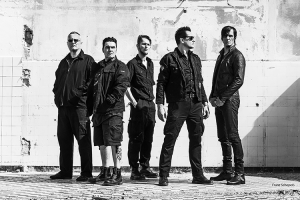 9. I felt that “The Machinists of Joy” was a sort of a comeback to the more electronic sound; it evoked, in some measure, memories of your earlier work. The album is indeed brilliant and very much to my liking, as I tend to lean more towards the electronic than metal part of your sound. What are your thoughts about that piece of work?
9. I felt that “The Machinists of Joy” was a sort of a comeback to the more electronic sound; it evoked, in some measure, memories of your earlier work. The album is indeed brilliant and very much to my liking, as I tend to lean more towards the electronic than metal part of your sound. What are your thoughts about that piece of work?
“The Machinists of Joy” was a kind of like a retrospective, if you will. It was supposed to be an album that sums up what Die Krupps had been about in the past, up to that very point. That’s why “The Machinists of Joy” is basically a comeback album, if you want. The next album was different for a reason.
Yeah, that’s my next question…
Yeah, for a reason. Like I said, we’re not going to be predictable for anybody and that’s what I love about the band. We also put out the “Stahlwerk Requiem” album, basically an experimental noise industrial album again this year. You know, I hate being predictable and I think this is what fans love. They love they have so many different options and because of this we’re not going around in circles, putting out the same shit like a lot of other bands, we’re doing our own thing, but we have a very broad spectrum of music styles that we can move around in. In the Die Krupps spectrum there’s a lot of different music styles which we have helped create and in that way we have all the right to do so.
10. So, this question is about ”V – Metal Machine Music” that is, as you said, completely different. I must admit, it felt a lot heavier to listen to. Was it your intention to go as far metal as you’ve ever been?
Well, let’s put it like that. What I wanted to show is that Die Krupps is not going to be… just because we are older now… that we’re going to be any quieter. So if you think Die Krupps is going to kind of slow down, we just won’t because, like I said, we have an awesome line up right now and this band is going to go stronger than ever before, I have a feeling. We have a lot to say, we have a lot of energy and we have a lot of ideas and lot of creativity and this is just the beginning.
11. So as a master of reinventing, how do you feel about today’s music scene, not only in terms of “underground” genres, but mainstream as well? What would be the recipe for staying alive in the music business of today? It’s a jungle out there…
You have to have your own niche, you have to have your own place. You have to know where you are, you need to know who you are…Basically, you need to know what you stand for and what you do and to keep that original spark of life that made you do it in the first place. That’s one thing that’s always been my goal to keep that spark and to keep that kind of energy alive. And I think that that way, if you will, helped us be… I don’t want to say popular… but helped us to stay in the race. Because I know definitely who Die Krupps are, what we stand for, what we’re liked for, why we’re liked, what I like about Die Krupps and where this thing is heading. And there’s nothing worse than having a band and loosing your thread and not find yourself any more. A lot of artists that I know, at some point, they become like karaoke machines of their own material. Or they basically put out albums because they think they have to progress, which is fine, it’s always fine to progress, but the thing is they forget where they’re coming from, they forget what they were originally about and they’re moving into a territory that’s not them. That is something that is not going to happen here, I can guarantee you that. And that’s why I think this is our way to stay in the race.
12. In time of social media, how much do you feel it is important to be present through such channels?
I think it is incredibly important. The problem is… Let’s put it like this: if I put us on Facebook, I think about it twice how often I do it and I also take breaks. I know at one hand it’s a great thing to post things and get your likes, keep the fire burning. On the other hand, there’s nothing worse than overfeeding people. Really, you just have to have something to say. It’s the same thing with the band. There’s another thing that basically makes us stay in the race and that is not putting out an album or some music if we have nothing to say. There are times when you better shut up, because you don’t have something valuable to contribute. That way, you better shut up, you don’t want to put out an album or anything and don’t play by the rules that the record company dictates, which is what we’ve always done. Other bands, they have contracts that makes them put out an album every year or every second year. We don’t have albums like that. We would never let anybody dictate when we’re going to put out our albums. We play in a way like Kraftwerk did, they did same thing. We have all the say and we do whatever the hell we want and that’s the way it should be. This is artistic freedom, that’s what we need. Otherwise you’re not an artist, you’re just a whore, a prostitute. We’re not prostituting ourselves, we’re not that kind of a band. You have to have something to say. If you don’t have anything to say, shut up!
13. Yes, unfortunately I’ve heard that about the albums from many other musicians… Let’s move on to the next subject. When it comes to your work as a producer, can you bring that part of your work a bit closer to us? How do you divide your time between your work as a producer and as an artist?
I work for Cleopatra Records full time, so that’s basically my number one job. It’s a job that I love because it’s very diverse, dealing with a lot of artists from all genres, from Iggy Pop, to Ministry, to Christina Aguilera, to DMX, to Afroman, to Angie Stone, to Nik Turner, to Hawkwind to Pink Fairies, to… anything you can imagine. I’ve done so much diverse stuff from dance to dub step to rock, anything, I don’t even know any more. I do up to 20-25 productions a month for Cleopatra and I’ve been doing that for 10 years now almost, so you can imagine. Look at the catalogue and like 70% or 75% of the catalogue goes through my hands, more or less. It’s great because I have the contacts with the artist or just do my thing. Usually I work in my studio my part, I have two, actually three, people in my team, all over the globe, from Spain to England or Austin, Texas. That’s basically my main job… But Die Krupps is my life.
But how do you divide your time between your job and your art?
I just work double shifts. When I have to do an album I usually do double shifts. I basically get very little sleep. And I work like 8 hours for Cleopatra or maybe 10 and then from 6 to 8 at Die Krupps, I sleep six hours and I keep going, that’s how it is. It’s actually a good thing, when you work on your own stuff, you sometimes just lose the ability to see things clearly, you need to step back and take a break and then you see more clearly again. That’s what I like to do. I like to work on another stuff, then go back to my own stuff. It really depends on the phase of the production. Closer to the end, you probably need to focus more on your own production, but in general when I start the production, I usually don’t spend much time on Die Krupps. The closer you get to the end to the finish line the more time you have to invest, so you stay focused.
14. Personally, I am pretty sure the world of art is not at all about money and glory. What do you personally consider to be the greatest reward for all the hard work that an artist puts into his art?
To be honest, the greatest reward to me is playing in front of our audience that is totally in sync with the band. That is the best! When you’re on the stage having the time of your life and you have an audience enjoying it as much as you are, that’s the best.
15. How do you feel about the available technologies and the way they have changed the whole process and value of the work itself when it comes to music and art in general? There are surely some pros and cons of the technological progress.
The cons are that basically every plug-in synth is available to everyone, which makes it a problem because everybody can download everything and use the same kind of sounds or whatever. And I think that’s bad in a way that you have too many choices and you have too many people using the same kind of stuff. A lot of young bands come up to me and ask how do we find our own sound and what do we do to not sound like everybody else. I was telling them “image yourself, pick what you like and stick with it and don’t touch anything else”. When we started out, I mean, there was one music store and I remember there was like two MS-20 Korgs, there was an Arp Odyssey, there was a Minimoog, there was a Yamaha synth and all the bands in Dusseldorf, we all basically knew that place. We went there and we bought the synth. I remember the MS-20s were gone because Robi from DAF bought one and Kurt Dahlke from Pyrolator and Der Plan bought one, Ralf, he bought the Yamaha and I ended up buying the Arp Odyssey. We all had our own sound because we couldn’t afford buying like 4 or 5 keyboards or whatever, and you basically had to work with whatever you had. And nowadays you go online, you download all those crap and pretty much everybody has the same kind of set up or equipment which makes it all a mash. It’s like the whole globalisation issue, everyone actually dresses the same, everyone listens to the same music and whatever the hell. That’s what the problem is. In my opinion you have to limit yourself, you have to decide what you want to be or just go and pick blindly; say, ok, I want this keyboard or this guitar or whatever. Everything nowadays is normed. It’s the same with guitars, with production, whatever. They teach you in engineering classes that when you record a punk band they have to have a Marshall and Gibson guitar, an alternative band has to have a Fender guitar and VOX amp, the metal band has to have a Boogie and speed guitar. And that’s the problem. That’s why all these bands sound exactly the same. That’s the cons. The pros is that if you don’t have the money to buy a synth you can actually go online, download one, download an app to iPhone and start making music. That’s the cool thing. But the problem is that the most people don’t realize that that way you are very unlikely to find your own niche easily. Unless you have a clear vision of what you want to do because of the massive number of apps and plug-ins and whatever the hell you can find on the web. You are pretty much overfed and it’s very hard to basically pick what you think is right for you. I think it’s very confusing. And it’s the same with all these millions of bands that can put out their own music on Soundcloud and all the other stuff. It’s great because it gives you the opportunity or a chance to reach the audience worldwide which obviously seems like a good thing at first, but on the other hand, since everybody can do it, it makes it harder for most bands. On the other hand, what makes it the hardest for the musicians is that record sales are down for 90% because of the fact that everybody can download everything and share it and distribute it without you seeing one cent from it. So, basically, that is the problem that’s killing music, which results in bands who don’t have daytime jobs to work constantly which gets to the point where you have bands like Front Line Assembly where people don’t show up any more as much as they used to or, on the other hand, bands like Hocico or whatever who need to tour all the time to support themselves financially from the tours or, basically, from the merchandise they sell at their shows. Back in the past you did a tour once a year, or maybe two years, because record sales were good enough to support the band. And nowadays most bands have to play all the time, unless they have daytime jobs, which is another problem because a lot of bands, because of the fact that big sales are no longer possible, they have to take daytime jobs which in the end makes their music or their output suffer. That’s what the pros and the cons are.
16. You did some cover songs during your career, but how did you decide to focus on Metallica and release “A Tribute to Mettalica” back in 1992?
The thing is, I had a metal label in the ’80s and one of the bands that I liked best was Metallica, at the time of “Ride the Lightning”, “Master of Puppets”… I really liked those albums. They released “The Black Album” in 1991 and when they released that album I thought that it was probably the best to date. And we basically decided that that was a good vehicle to promote what we saw as a combination of… OK, I can’t explain that.
Basically, I did it when I did a metal label. I did it because I liked the preciseness of the way the speed and trash metal guitars are playing and the drums and everything. It was like a clockwork, like a machine almost. So when I decided to merge the two, basically the metal and the machine music of Die Krupps, it was a very early time when most people haven’t heard of it and it was actually causing a lot of head scratching. People were thinking “What the hell is this? You can’t do that!”. I remember my record company told us we were crazy, that we were never going to be able to sell that kind of stuff and I said: “You know what, we’ll prove to you that this is possible.” You can actually crossover. You can actually make both ends meet and we can do Metallica tracks with electronics to show you that this is possible. You can actually combine the elements and you can also make audiences aware of that. So, it was like an experiment which worked out very well because on one hand it’s sold quite well, on the other hand Metallica liked it, Lars Ulrich and Kirk Hammet and they actually invited us. We went to one of their shows here in Dortmund and they told me they would try to get us a record deal, which they did. We got a record deal in the US for the album. So, that was the story behind it. We were basically trying to make people aware of the possibilities of combining different elements and making them work.
17. What are Die Krupps doing at the moment, regarding new materials? Is anything new coming our way any time soon?
We are working on a new album right now. Right now there is no new release planned for this year, except for a single and a video, but the new album should be out either late spring next year, I would say May, or September. In between we’re going to do some festival shows of course and I guess, hopefully, play in England, do an American tour, and tour some more in Europe and South America. This year we are only going to do a tour in Japan again and maybe a show in Mexico, we’re not sure yet. But it’s under discussion at the moment.
18. And to conclude the interview, since I don’t want it to be all serious, I have one funny question for the end. Can you please tell us who came up with the idea for “To The Hilt” video? I can never get enough of it, I must have watched it like a thousand times. 🙂
The idea was actually Joseph Kahn’s. He was the video director at the time. He was actually a young director from Huston, Texas. And he called me up in New York at the time, I had my apartment there. And he called me up and he said he would love to do Die Krupps video, that he is a big fan and he wants to do a video. So we met… Actually, he sent me a showreel and he’d done some stuff for rap and hip hop bands like Scarface, Geto Boys, he did a video for, I think, Willie Nelson. But he was a young guy, maybe 20-21 years old, but he was already kind of getting established. Then I met with him and we decided to work together and he did a video for “Fatherland” and then we moved to the next single releases, which were “To the Hilt” and “Crossfire”. It’s funny because we shot both videos the same day with two crews, one outside the club, one inside the club. And he came up with the whole story and the idea of shooting the video in one go, basically without any edits. It had to be planned very well. We actually spent more time on the choreography than on anything else. We really had to rehearse it over and over and over so we would be able to do this whole thing in just one shot. That was the idea and the interesting thing is the video became number two in the European MTV awards in 1993 or 1994, and with that success he went to New York first to hook up with some big agents and then he moved to LA and he hit it big. When you read his list of clients after he did our “Bloodsuckers” video, which was another one he did, he did everything from Britney Spears, Backstreet Boys, to U2, to Madonna, to Lady Gaga, he did everything you can imagine. I mean, that’s big out there. It’s crazy. He’s probably one of the biggest music video directors worldwide. Pretty amazing!


